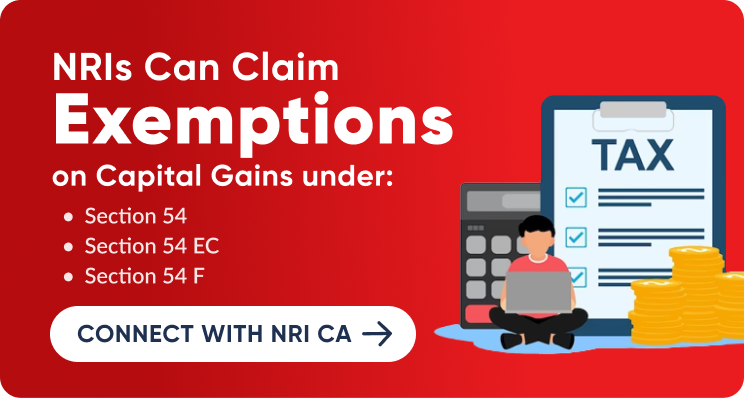Indian residents move abroad because of various reasons like employment, business, study, or other purposes. When these residents stay abroad for a particular period of time, their status changes to NRI. When your residential status changes to NRI, you must comply with rules and regulations defined by FEMA (Foreign Exchange Management Act) as failing which will result in financial and legal penalties. For example, NRIs can’t operate a regular savings account and need to open an NRI account. Moreover, tax rules are slightly different for NRIs. However, there is no penalty for not declaring NRI status.
For any NRI income tax related queries, you can get in touch with an NRI tax expert right away.
Let’s understand new rules for NRIs and consequential penalties for not following them.

How to Determine NRI Status?
First of all, let us understand when a person becomes an NRI. An individual will be treated as a Resident in India for a financial year if he/she satisfies any of the following conditions are:
1. If he/she is in India for a period of 182 days, or more during the relevant financial year. Or
2. If he/she is in India for a period of 60 days or more during the previous year and 365 days or more during 4 years immediately preceding the previous year.

You can calculate 182 days applicable for NRIs in 2023.
An individual who does not satisfy both the conditions mentioned above will be treated as a Non-Resident in that previous year. However, each year, the government introduces new rules for NRI status and taxation.
Is There any Penalty for Not Declaring NRI Status?
According to the FEMA (Foreign Exchange Management Act), there is NO penalty for not declaring NRI status. But, you must close your existing savings account or have it converted to an NRO account. An NRI continuing to hold his/her resident savings account after gaining the NRI status is considered illegal under the FEMA guidelines and doing so may attract hefty penalties.
What is the Penalty for not Converting a Savings Account to an NRO Account?
If your residential status changes to NRI, then it becomes necessary for you to convert your savings account to an NRO account or close your existing account and open an NRI account. Penalties would be imposed if you fail to convert the savings accounts to an NRO account on time.
Under the Act, any individual who fails to do so is liable to pay up to 3 times the amount involved in the existing savings account or Rs 2 lakh when the sum is not quantifiable. In addition to this, a penalty of Rs 5,000 gets charged every day from the first day of intervention until the penalty is paid.
What to do when you Become an NRI?
When a resident Indian leaves for abroad for business or employment opportunities or any other purposes for which he/she may require to stay outside the country for an uncertain period, their residential status may change from a resident Indian to a non-resident Indian (NRI). In such cases, he/she is required to either close the existing savings account or convert it to an NRO account. This account can be opened for depositing income earned in India.

The source of income can either be rent, dividends, etc. The money in an NRO account is maintained in the Indian rupee, and any interest earned on the same is subject to a tax deducted at source (TDS) at a specified rate.
Why to Convert a Savings Account to an NRO Account?
An NRI can open primarily two types of NRI accounts – NRE (Non-Resident External) account and NRO (Non- Resident Ordinary) account. However, an existing savings account can only be converted to an NRO account. You can also close your existing savings account and open one of NRI accounts.
How to Convert a Savings Account to an NRO Account?
Here are the steps required to convert a savings account into an NRO account:
1. First, you need to contact your respective bank and ask about the process of conversion.
2. You can either get the application form or download it from your bank’s website.
3. Then, you need to fill out all the necessary details and get it signed by the account holder.
4. If there is any fixed deposit (FD) associated with the account, you need to make sure that you attach the receipts of the same.
5. Submit the form along with the required documents at the bank branch in case you are in India.
6. If you are in another country, then you can submit the form along with the documents to the bank branch after getting them attested by the Indian embassy in your new residence country.

Documents Required for Conversion
Here is the list of required documents that need to be submitted along with the NRO account application form:
- FEMA declaration form
- PAN card (one copy)
- Resident bank account closure form
- Bank account opening application form
- Passport size photographs
- Foreign residence address
- Valid visa/OCI or PIO card (one copy)
- Passport (one copy)
Declaring NRI Status
While there is no penalty for declaring NRI status, there are different laws for NRIs concerning banking and taxation. NRIs need to open an NRE account to deposit and maintain their foreign earnings and NRO account for their earnings in India. Interest earned in an NRE account is completely tax free in India. Tax will be applicable on interest earned in an NRO account.
If you have recently acquired NRI status, make sure to get your savings account converted to an NRO account as early as possible. You can also close the savings account and opt for a new NRI account (NRE, NRO, FCNR) to meet your banking needs and avoid the penalties levied under FEMA.
Whether you want to open a new NRE/ NRO account or convert your resident account to an NRO account, you can apply for the same online through SBNRI. Download SBNRI App to apply for an online NRI account in India with nominal documentation in just 10 minutes.
You can also click on the button below to apply for an NRI account. Visit our blog and YouTube Channel for more details.
FAQs
If you continue operating a resident account after change in your residential status, it carries a penalty of up to 3 times the amount in your savings bank account or Rs. 2 lakh.
NRIs need to pay income tax on their earnings in India. They need to pay tax on income that accrues or arises in India, or deemed to accrue or arise in India. Income received or deemed to be received by NRIs is also taxable in India.
For NRIs and PIOs living outside India, the condition of 60 days is extended to 120 days when they visit India, if the total income of such a person in India is more than Rs. 15 lakh.



